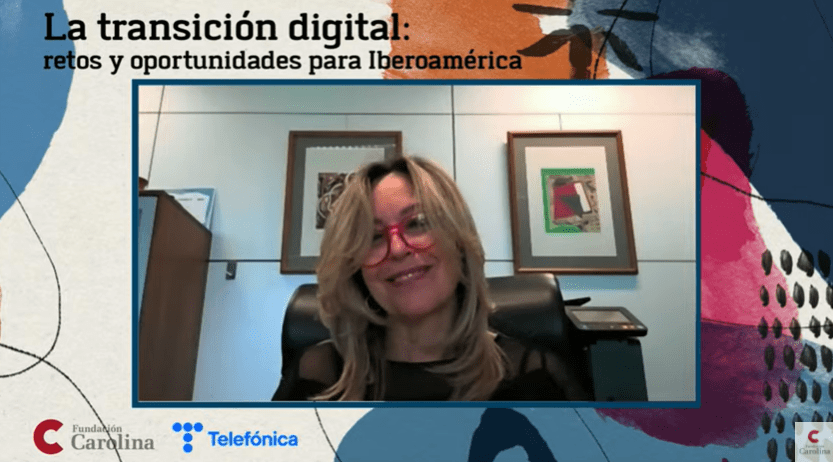Telefónica and the Carolina Foundation have just introduced the book “The Digital Transition: Challenges and Opportunities for Ibero-America” (only available in Spanish). This project aims to support the academic study of digital transformation and provide solutions that inspire new public policies for an inclusive and sustainable digitalization in the region.
The presentation was attended by Trinidad Jiménez (Director of Global Public Affairs Strategy at Telefónica), José Antonio Sanahuja (Director of the Carolina Foundation), Isabel Álvarez (Director of the Complutense Institute of International Studies), Alan Fairlie (Senior Lecturer in Economics at the Pontificia Universidad Católica del Perú), Juan Luis Manfredi (Professor at the University of Castilla-La Mancha and holder of the Prince of Asturias Chair at Georgetown University), and María Beatriz González Sánchez (Professor of Economics at the University of Vigo).

For more than 20 years, Telefónica has been actively collaborating with Fundación Carolina to promote public-private cooperation with a focus on Latin America of great value. As Trinidad Jiménez pointed out, “our purpose is to shape a more humane world by connecting people’s lives, generating new opportunities for all, leaving no one behind”.
This book is a continuation of the first edition of the program: “Inclusive and Sustainable Digitalization in Latin America” of 2020. This joint project has taken as a reference the concepts developed in the “Digital Deal“, published by Telefónica in 2018, to achieve a more digital, fair, inclusive and sustainable society, as well as the activities of the Carolina Foundation aligned with the 2030 Agenda. The result has been a rigorous and exhaustive analysis which captures the potential of the spread of information and communication technologies in human progress, the reduction of the digital divide and the development of knowledge societies.
“Almost all sustainable development goals find inclusive and sustainable digitization a key element to advance in their achievement.”
Trinidad Jiménez
The drafting of the book has been supported by academic studies from analysis centers or scientific institutes in Argentina, Brazil, Chile, Colombia, Costa Rica, Spain, Mexico and Peru. Ten research studies have been carried out on a wide range of topics, including business innovation, educational digitalization, urban design, attention to the disabled, or modernization of public administrations, among others. These studies are expected to be useful for the design and implementation of innovative, green and inclusive strategies, both in the private and public sectors.
Among these academic essays, four were selected to be part of the book. Several authors from each of these studies also took part in the event to give a brief introduction to their work and provide their insights. In general, all four studies are a fair representation of the main challenges and problems of digital transformation in Ibero-America.
Firstly, “Digital transformation in Ibero-America: an opportunity for inclusion in the post-COVID19 era”, emphasizes the widening of pre-existing social and economic gaps and the emergence of new gaps, such as the digital skills gap.
Secondly, “Digitalization challenges for the internationalization of higher education in the countries of the Andean Community,” examines the process of internationalization and digital transformation of higher education while stressing the need to introduce policy instruments to support these processes.
Thirdly, “Urban policies for digital inclusion in Ibero-America. Good practices and proposals for improvement”, presents ten recommendations on digital and inclusive policies with the idea of integrating people with disabilities into the new social contract that digitalization processes are promoting.
Lastly, “The role of management control systems as catalyst of businesses’ digital transformation in Spain and Latin America”, analyzes the changes in the business model, structure and organization of companies due to digitalization, and gives keys for a successful digital transformation.
Ibero-America is facing growing inequality due to the abrupt digitalization process. It is crucial for the region to strengthen its resilience and adaptive capacity through the training of individuals in digital skills, public-private cooperation and international cooperation. The digital transformation has highlighted some weaknesses of Latin American countries, but it is also the key to overcome them.
Click to watch the stream:








